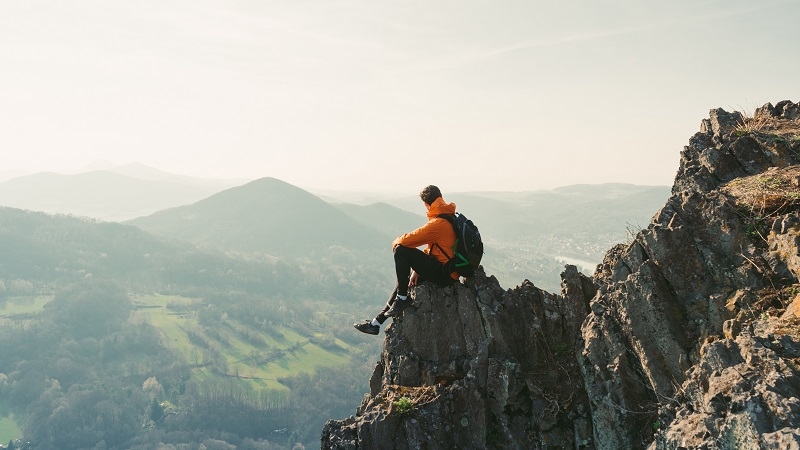
Solo travel may be one of the most transformational experiences a person can engage in. For spiritual travel, it can be an independent journey of contemplation, personal growth, and spiritual connection.
If you are going to religious sites, attending religious retreats, or trekking through spiritual terrain, solo travel and mindful solo travel tips enable you to become intensely engaged with your religion, culture, and yourself. It also entails meticulous planning, attention, and preparation at the same time. Here, we’ll explore essential tips for solo faith travelers and provide spiritual solo travel advice, including Jewish solo travel safety and finding kosher meals for solo travelers, to make your journey safe, enriching, and memorable.
Solo pilgrimage to holy places provides the luxury of traveling on your own preference and coming closer to your own religion. Independent travel, as compared to traveling in a group, provides solo contemplation and uninterrupted meditation with time to reflect upon your experience and ideas. Most of the travelers have freedom and self-discovery while they travel to holy places on their own.
But solo religious travel is not all sunshine, either. People interaction, logistics, and safety are near the top of the list. That's where useful solo religious travel tips come in to ensure your trip is safe and meaningful.
Planning is one of the secrets to successful solo religious travel. Planning not only prevents you from unnecessary risks but also enhances the cultural and religious richness of your trip.
Prior to departure, research the religious practices, traditions, and niceties of where you are going. If you're doing a Jewish heritage tour of Israel, to monasteries in Greece, or pilgrimage sites in India, you'll be interested and considerate if you study first.
For individual faith traveler tips, selecting the accommodation according to your religious needs can count. Attempt to book faith lodges, retreat facilities, or hostels that are known to be prepared for solo travelers. Such facilities also provide kosher foods for solo travelers, vegetarian food, or prayer facilities according to your religion.
Solo travelers must take precautions that secure their safety without being overly restrictive to their spirituality.
Jewish travelers generally need to know about Jewish single traveler security, particularly if they are traveling to a less welcoming place for Jewish facilities.
Carry an international-access cell phone and power backup. Leave valuables in hotel safes and have copies of critical documents. Trust your instincts—if it feels wrong, move away. Learning a few basic phrases in the local language or working with local guides can contribute greatly to your sense of confidence and security.
One of the benefits of traveling alone for spiritual reasons is that you can be present throughout the whole trip. Solo travel with awareness can get you present in the moment, soak in your world completely, and tune in on yourself inwardly.
Begin the day meditating, praying, or writing in a journal. Mindfulness exercises keep you centered on transit time and offer spiritual continuity. They are simple to add and will enrich your experience, even in the midst of middle-of-the-night solo travel.

Some reflective solo travel customs are walking meditation as one approaches sacred sites, a couple of deep breaths as one enters sacred sanctums of devotion, and observing local rituals with respect. Do not overfill your itinerary; leave space for immersing in an atmosphere, relating to individuals, and resting when needed. Mindful travel eliminates stress and leaves space for more enriching spiritual experiences.
Solo religion travel does not have to be solitary. And in reality, some of the most rewarding experiences can be in contact with locals, fellow travelers, and religious leaders. Being able to arrange such contact is a significant aspect of solo religion travel advice.
Attend religious services, meditation, or communal dining. These all offer a natural way of meeting other like-minded people. For example, Jewish tourists can attend synagogue activities or cultural tours, both of which are socially acceptable and secure.
Technology can also bring you together as you travel solo. There are apps like Meetup, FaithTravel, or even Facebook groups in the area where you can find spirituality meetups or meetups for solo travelers. These websites can also provide you with tips on kosher solo traveler food, prayers, and culture.
Volunteering with religious organizations or participating in humanitarian activities not only enhances your bond with society but also offers a good means of returning the favor. It presents an opportunity to engage the locals and fellow travelers as well, lessening the loneliness.
Here are a few tips for solo faith travelers.
For individual travelers, the minimum must be packed. Bring along small religious travel books, prayer mats, decent clothing according to local traditions, and a basic first-aid kit. Never leave behind jewels, medicine, and important documents.
Journaling or blogging about your experience solidifies memories and personal learnings. The activity also enhances spiritual contemplation because you can reassess lessons along the way.
Preparation is essential, yet include some room for spontaneity. Solo faith travelers have discovered hidden gems or created improvised spiritual experiences due to being flexible. Flexibility also ensures security because excessive planning sometimes makes one vulnerable. As a religious traveler, one must not only watch out for personal safety but also be sensitive to local people's religion and customs.
An understanding of greetings, dress, and what constitutes acceptable conduct in sacred environments averts unintentional disrespect. Unobtrusive dress is generally required in the majority of temples, mosques, and churches, and several Jewish sacred sites possess specific visitor traditions.
When dealing with locals, remain humble and open. Don't force your faith upon them and respect their beliefs. Humility and genuine interest will more than likely lead to more meaningful, insightful exchanges.
Solo travel, as convenient as it is, even for spiritual travel, has some drawbacks. Loneliness, intolerance to food, and not being able to communicate are a few.
Even experienced lone travelers will get lonely. Practice meditation, journaling, or photography to stay connected with your inner life. Attending group services or retreats on an occasional basis also offers companionship without sacrificing your solo journey.
Healthy meals are the foundation of religious practice and well-being. Jewish kosher solo travelers will need to do some advance research on their food. Most urban centers will have websites or apps that will only function to provide lists of restaurants, markets, and delivery outlets that are kosher.
Mastering key phrases in the native tongue or using a translation app increases your confidence and facilitates interaction. Individuals will appreciate the effort, and it can even lead to more intimate relationships.
Small, seemingly mundane tasks can take on great spiritual significance when practiced with mindfulness. Solo spirituality travelers can seize everyday moments and turn them into moments for reflection and connection.
Spending time outdoors in nature, such as parks, riverbanks, or gardens, can help practice spiritual connection when traveling alone. Nature sometimes provides a quiet atmosphere that one can use for prayer, meditation, or contemplation.
Photograph holy places and record activities in a journal to attempt to sort out feelings and have a spiritual memento to look back on in the future.
Conversing with the locals in small acts of goodwill, like helping one find his or her way or a meal, is evidence of your connection with the people and manifests the beliefs of your religion in everyday life.
Whether it is in the silence of reverence in a temple, the communal energy of a synagogue service, or nature that encourages us to ponder, independent faith travel holds the unique promise for spiritual growth and self-discovery. With planning, consciousness, and an open heart, your solo trip can be safe and life-changing.
This content was created by AI